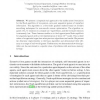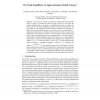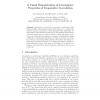26 search results - page 2 / 6 » How Discontinuous is Computing Nash Equilibria |
WINE
2007
Springer
14 years 5 months ago
2007
Springer
We present a computational approach to the saddle-point formulation for the Nash equilibria of two-person, zero-sum sequential games of imperfect information. The algorithm is a ï¬...
SAGT
2010
Springer
13 years 9 months ago
2010
Springer
Abstract. One reason for wanting to compute an (approximate) Nash equilibrium of a game is to predict how players will play. However, if the game has multiple equilibria that are f...
FMCO
2004
Springer
14 years 4 months ago
2004
Springer
In 2-player non-zero-sum games, Nash equilibria capture the options for rational behavior if each player attempts to maximize her payoff. In contrast to classical game theory, we ...
SAGT
2010
Springer
13 years 9 months ago
2010
Springer
The PPAD-completeness of Nash equilibrium computation is taken as evidence that the problem is computationally hard in the worst case. This evidence is necessarily rather weak, in ...
PPSN
2004
Springer
14 years 4 months ago
2004
Springer
Abstract. We introduce a model for cooperative coevolutionary algorithms (CCEAs) using partial mixing, which allows us to compute the expected long-run convergence of such algorith...



